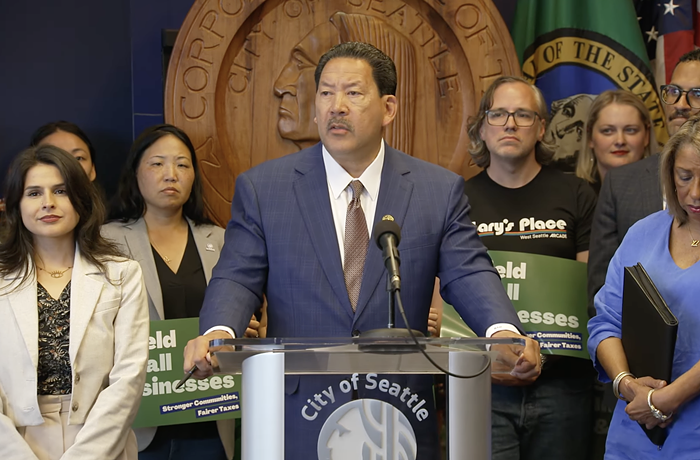The Seattle City Council voted unanimously Monday to put progressive revenue on the ballot in the general election this November. Don’t get too excited—we didn’t jump into some sort of alternate universe where we have a progressive city council and mayor (though, that could happen in this reality depending on if you vote how we tell you today). Our electeds just finally decided to do something about the hundreds of millions of dollar city budget deficit we’re facing.
Enter: The Shield Tax Initiative. Originally proposed by Councilmember Alexis Mercedes Rinck and an election-wary Mayor Bruce Harrell, the legislation was billed as a defense against federal government-induced cutbacks in key service areas. These included housing vouchers, shelters, food access, resources for survivors of gender-based violence, and affordable housing. To do that, Rinck and Harrell proposed raising the Business & Occupation tax for some big businesses while lowering it for 90 percent of Seattle’s businesses—a win for mom and pop shops and a thorn in Amazon’s side.
In original forecasts, staffers in the Office of Economic and Revenue Forecasts estimated the new B&O tax legislation would garner an extra $90 million for those services. However, after the council tacked on more than a dozen amendments such as one exempting Fred Hutchinson Cancer Center and Seattle Children’s Hospital from the tax, the new projections fell to around $80 million.
The Shield Tax was pitched to the public as a way to protect Seattle from a belligerent federal government, but the reality is we’ve desperately needed more progressive revenue in this city years before the financial threat of President Donald Trump. On Monday, budget staff estimated that the council is looking down the barrel of an estimated $150 million deficit (or higher, if the economy tanks). That number is an improvement over the $240 million hole in a previous budget forecast, but not something we can just wish away with pro-business thoughts and prayers. Reworking the B&O tax will help close that gap.
Whatever we can do to avoid austerity—the cutting back of necessary programs to save money—is good. At last week’s council meeting, the vast majority of public commenters spoke in favor of the bill. They represented food access organizations worried about evaporating federal funding, organizations that provide services for victims of gender-based violence, and homelessness service providers. “We’re the backup when the federal government fails us,” said a commenter who works in senior meal programming.
“Please don’t forget about us,” said several other commenters.
Navigating budget deficits is difficult for any city, but it’s especially hard for one in Washington, a state with one of the most regressive tax systems in the country. We want to tax the rich (income tax), but we can’t, so we tax rich businesses, angering wealthier businesses and their mouthpiece, the Seattle Chamber of Commerce.
“The city’s proposal gives needed relief to small businesses, something that we—and voters—strongly support, but we are disappointed that city leaders have also chosen to raise the B&O for many other hometown companies, making Seattle’s economic environment more volatile and uncertain,” Rachel Smith, president and CEO of the Seattle Metropolitan Chamber of Commerce said in a press release. “This policy choice simply misses the mark.”
In public comment last week, the Downtown Seattle Association said that this bill would discourage business development when we should be focusing on filling vacant buildings downtown.
The new rules for the B&O tax limit what businesses have to pay. Now, businesses with gross revenue under $2 million will be exempt. According to the City, more than three quarters of current B&O taxpayers would no longer pay the tax, and about 90 percent of Seattle businesses would owe less than they do today.
“This is a significant win for Seattle’s small businesses and our broader community,” Harrell said in a statement. “By reducing taxes for 90 percent of businesses, we are helping local entrepreneurs thrive and compete while ensuring they can continue to contribute to the fabric of our neighborhoods.”
The remaining 10 percent of businesses would absorb the B&O burden, and raise the additional $81 million.
However, the wider economic landscape remains unpredictable. The impacts of Donald Trump’s tariffs haven’t been fully felt. We’re still teetering on the edge of a recession and last month’s job report—which also revealed the gloomy reality of May and June’s jobs reports—was so dismal Trump fired the person who reported the facts. If this swirling cloud of economic disaster ever makes landfall, it could prove tough on a now-smaller-than-ever pool of businesses paying more into the B&O tax that’s providing the scaffolding to keep the city aloft, according to the council’s central staff’s financial report.
It’s a risk the city will have to take if we want to keep essential services and programs intact while the federal government fucks around with everyone’s livelihoods. The voters will ultimately decide this November. So, prepare yourself for the onslaught of business association-backed attack ads in the coming months and ready your ballot-bubbling pens.




